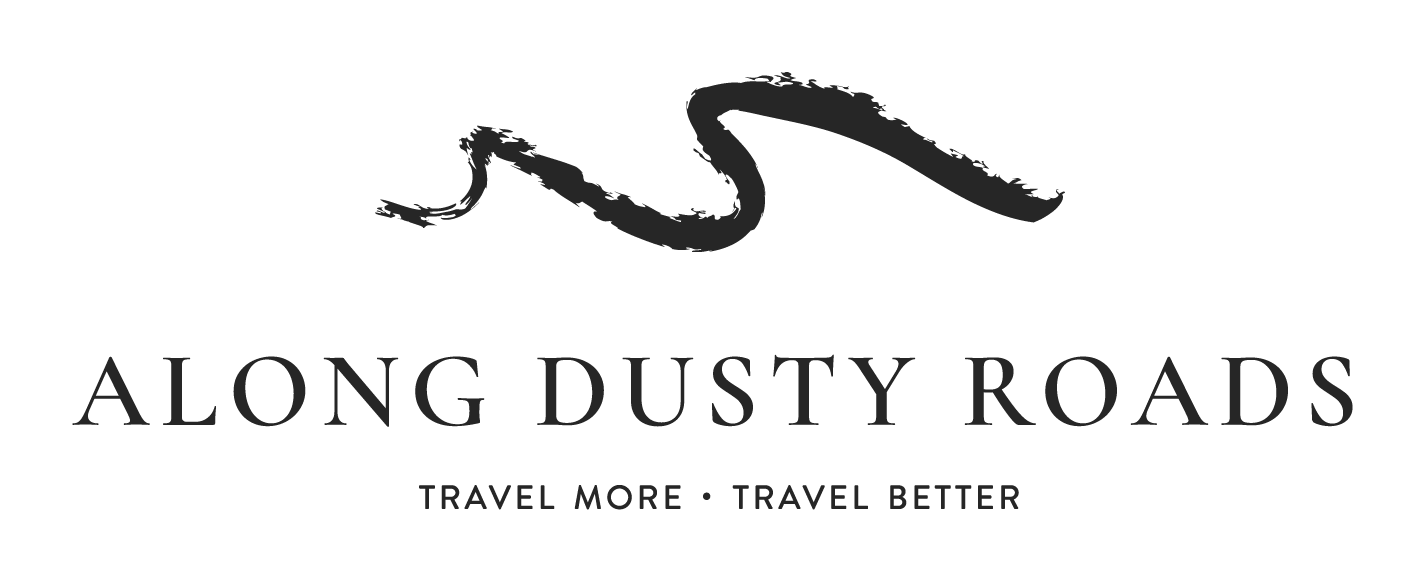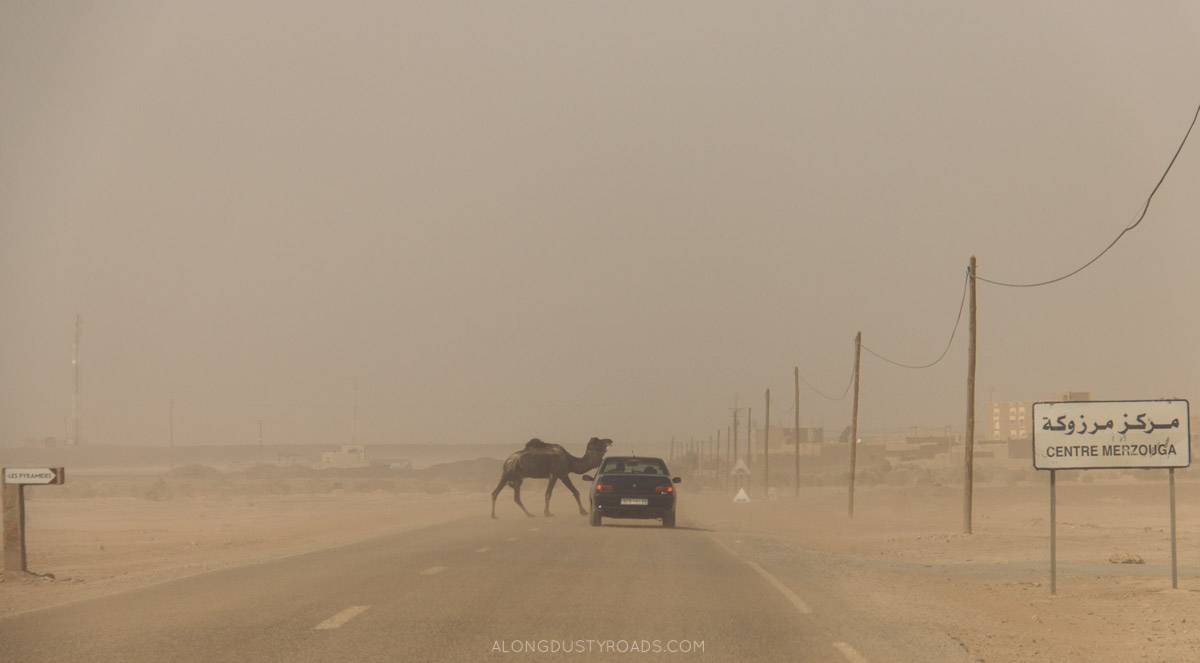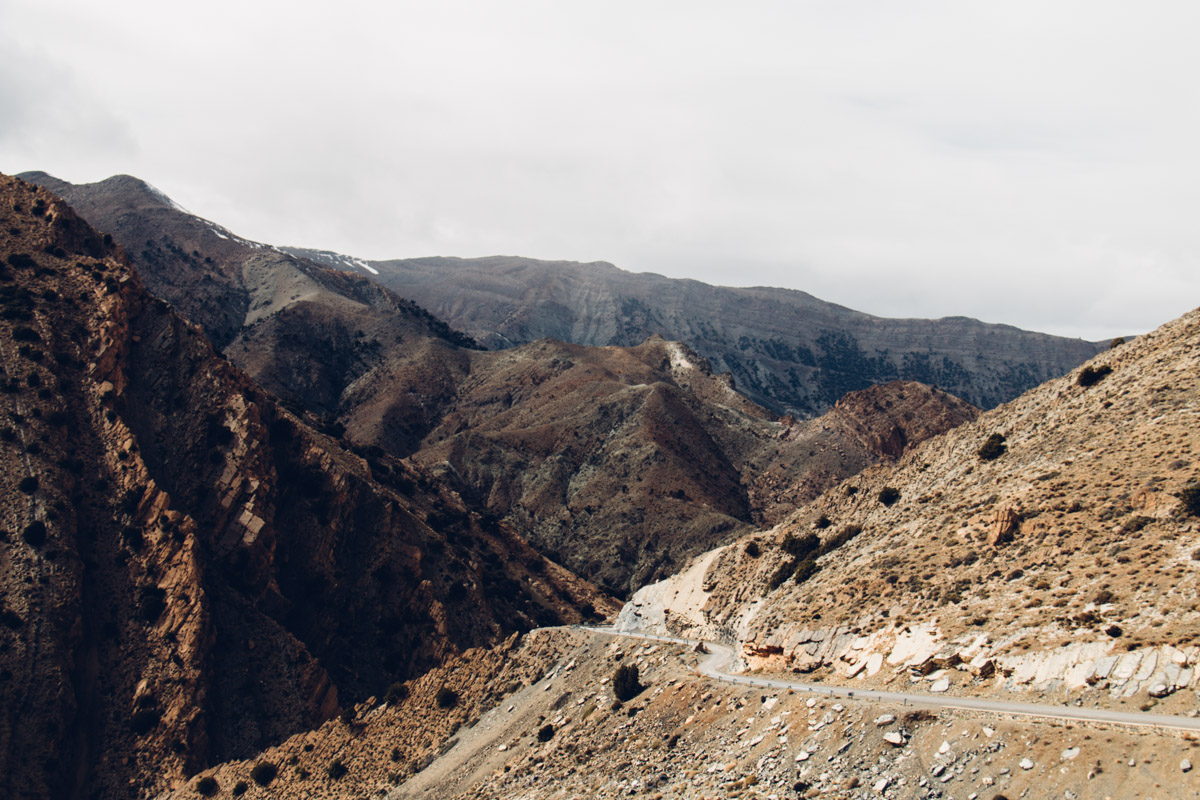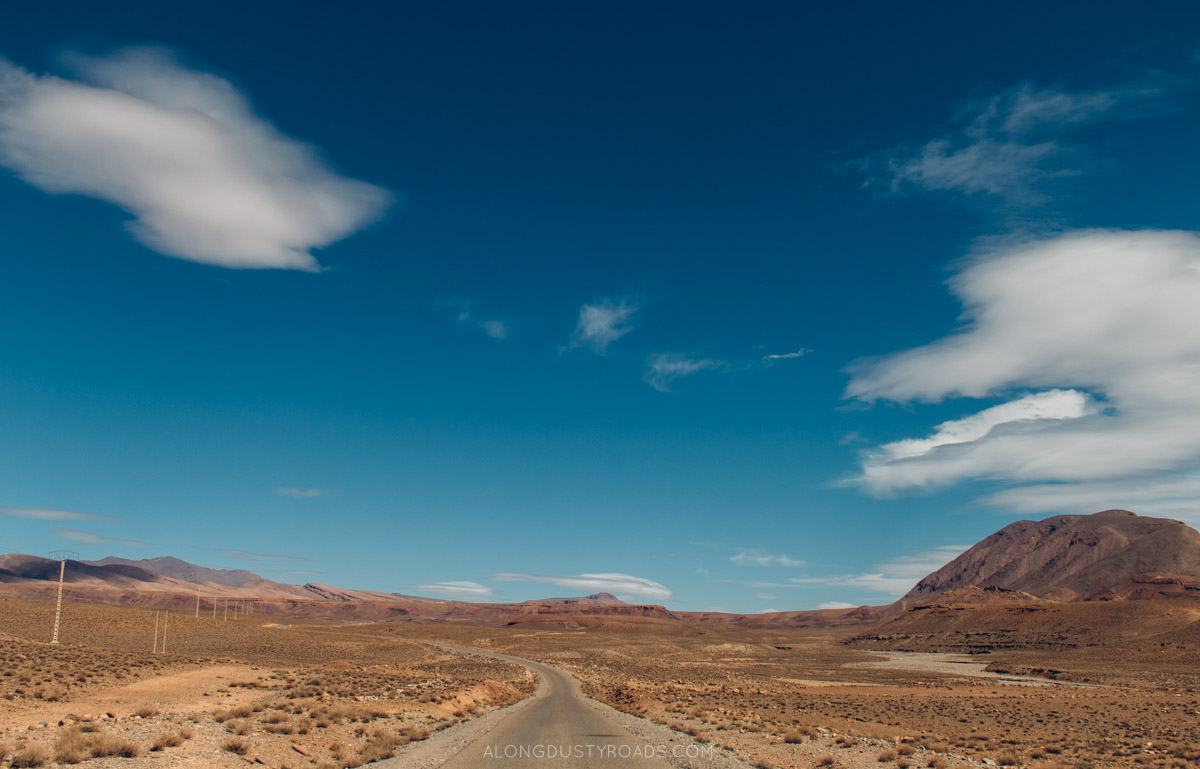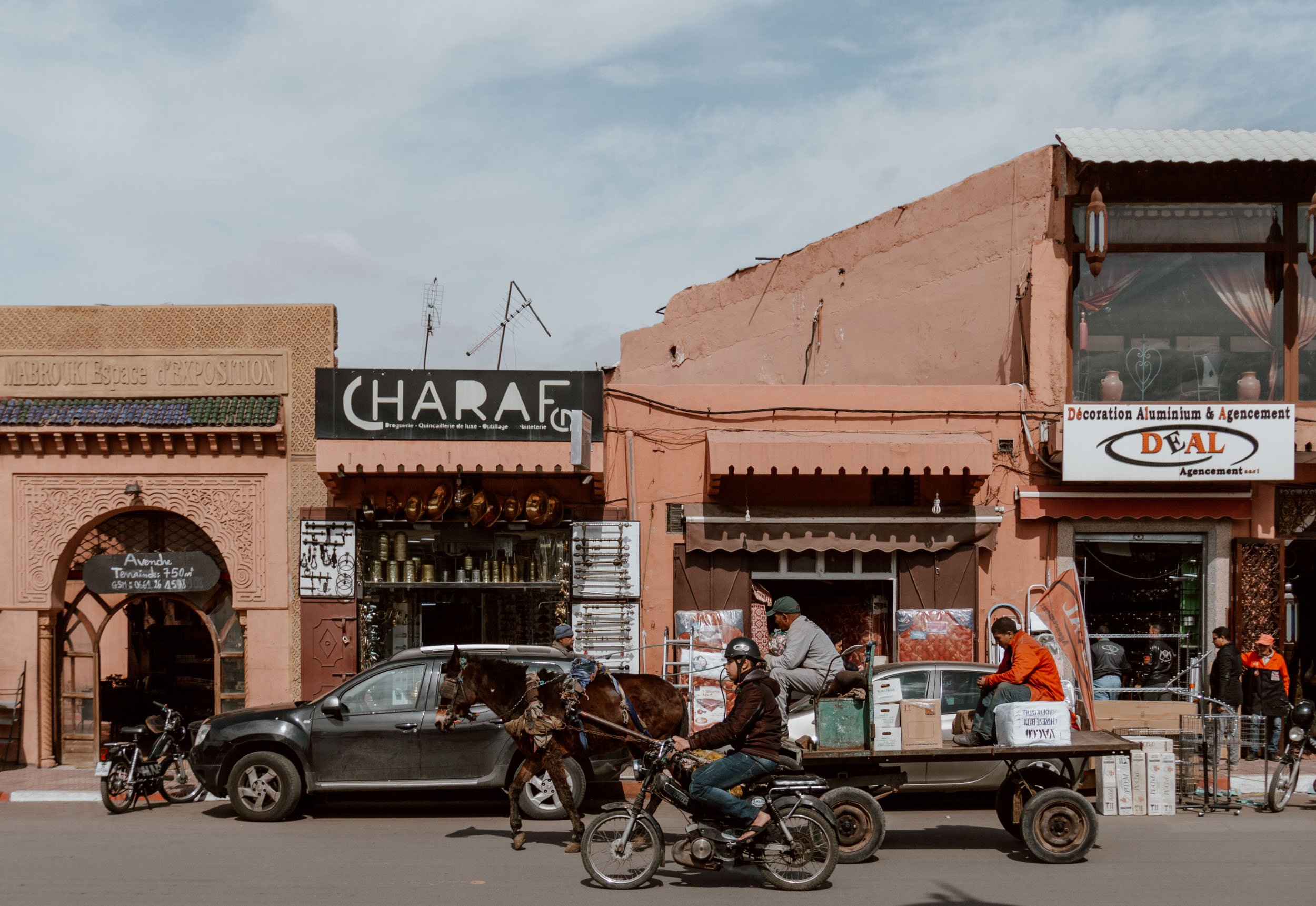We spent a long time worrying about how we would manage to see some of the best parts of Morocco on our two-week visit. This was our second time in the country, and we were determined to make it to the Sahara Desert from Marrakech, whilst we had also heard such great things about the scenery high in the Atlas Mountains that we knew we couldn't miss it.
The only way to do it all, and to do it in a way which gave us enough freedom, time and flexibility to have the sort of adventure we had dreamed of, was to rent a car and have our very own Moroccan road trip.
It was the best decision we made.
Road tripping through Morocco however is not without its challenges and idiosyncrasies. Here are our 21 things to know before you take the plunge and set out on the great open road.
why take a road trip in morocco?
Followers of Along Dusty Roads and our travel philosophy will know that we aren't fans of taking tours unless it's wholly necessary or delivers a unique perspective on a place; we much prefer making our own way or taking public transport. However, in Morocco, it seemed like our options were limited.
The public transport system to the desert would necessitate a few 12 hour bus rides, and the schedule between key parts of our itinerary was often limited to early morning or evening departures. This would have meant making a lot of compromises and inevitably spending more time in the bus than out on adventures - something you can only tolerate if you're travelling long-term.
It's understandable therefore that multi-day desert tours leaving from Marrakech (and other major cities) are the most popular option amongst short-term visitors. The standard offering lasts 3 nights, and follows a prescribed route via Ouarzazate - with prices starting at a very reasonable £80 per person. However, the convenience of such a tour is often outweighed by your inability to be spontaneous, the need to always rush to the next place and the inevitable presence of somebody in the group who you don't like! It also means A LOT of time stuck in your bus covering over 1,000 kms in a short space of time.
Renting a car meant we could plan our own route (you can read it here), take the time to stop off where and when we pleased, head off the beaten track and get to know Morocco in a much more intimate way over a longer period of time.
This is what you need to know before doing it yourself.
#1 it's cheaper than you might think...
So, give us your best guesstimate for our combined car rental, insurance and fuel costs for our 1,400 km round-trip across 6 days.
Got it?
Ok - all in - the costs associated with car rental totalled just under £200 GBP! Split between two of us, that's comes to just £16 each per day!
Update 2022 // The prices of car rental shot up globally in the last couple of years due to companies having very little business and selling off quite a bit of their vehicles. Good deals can still be found though, and we recommend searching via Rentalcars.com or Auto Europe first in order to get an idea on prices and availability for your own Morocco road trip dates!
#2 ...but you will have rental company issues
That cost however doesn't factor in the stress and frustration associated with actually renting a car in Morocco.
Spending the night trawling through Trip Advisor reviews of car rental companies available at Marrakech airport left us feeling very very very fearful. Aside from any linguistic barriers, there appeared to be so many things that could and would go wrong.
People had turned up to find no car available, or that their pre-selected shiny vehicle was actually a rust bucket on its last legs. There was confusion and concern over insurance coverage. Intentional omissions when recording damage so that further charges could be made when the car was returned. Deposits unreturned for no apparent reason. Paperwork in a language they couldn't understand.
And this wasn't just at one company - each one in the city had no shortage of travellers advising that they wouldn't recommend them to anyone after their experience.
Nevertheless, we needed a car and this was the only (legal) way to secure one. We decided to book via Auto Europe, a UK-based aggregator which brings together all the various local rental options in a destination and provides a secure booking platform. It had the cheapest offers we could find online, but our main reason for choosing them was so that we would have greater certainty over our insurance coverage in the event that something went badly wrong - we didn't want to depend on something purchased at the rental desk on the day and only understood via our interpretation of French and Arabic.
A good alternative is Rentalcars.com, and we usually search via both to find the best deal.
Picking up our car from the local company highlighted that the paranoia of previous visitors was not misplaced - we had a beaten and scratched automatic, when we had supposedly ordered a relatively new manual. However, the research of the previous night meant we came prepared for scams and tricks, and we requested each scratch and cigarette burn on the fabric to be forensically detailed on the paperwork and insisted that we be allowed to take a video of the car's condition.
It may have felt like overkill at the time, and didn't exactly allow us to strike up a friendly relationship with the dealer, but we are so happy we did it. When returning the car nearly a week later, the attendant remembered us but still tried out a few tricks - thankfully reading about the unfortunate experience of others meant we were able to anticipate and deal with these issues.
Tip | If it’s your first time renting a car, then we highly recommend you read our post 9 Essential Car Rental Tips for Travellers - it’s full of advice on how to find cheap car rental deals, how to avoid scams and hidden fees, and a clear overview of what insurance coverage you really need.
Since our Morocco road trip, we’ve also found a much cheaper way to insure rental vehicles - it’s covered in the above article.
#3 you need to be an experienced driver
We wouldn't recommend driving in Morocco to anyone who isn't a reasonably confident, reasonably experienced driver. There are no shortage of challenges and obstacles on the roads (more on that later!), and it can be very stressful at times; taking a rental car round dozens of single-track hairpin bends in a few hours or down a busy motorway where the lane markers are just a 'guide' really isn't the best idea if you already struggle to drive in the UK or Europe.
Oh, and remember, they drive on the right hand side of the road over here! If it's your first time driving on the wrong side (we're British, we drive on the correct side, deal with it) then you will get used to it quite quickly, but just go slowly and keep your wits about you those first couple of days.
#4 obstacles come in all shapes, sizes and species
Stubborn donkeys, children jumping out to try and sell herbs and rocks, hitchhikers (real and fake), men literally standing in front of the car trying to get you to visit their restaurant, thirty camels crossing (no joke!), cyclists and groups of men out walking on the road in pitch black, many cats and gossiping chickens, packs of mules and herds of goats, epic sandstorms, Europeans in oversized camper vans, massive slow clunking trucks on mountain passes, scooters and clapped out motorcycles winding between the traffic, young and old women carrying back-breaking loads, drivers who don't think sticking to a single lane or giving you an inch of space is a good idea, pedestrians who don't seem to understand that crossing a busy motorway isn't a great idea. And more donkeys (and a paaaaartridge in a pear tree!)
These are all obstacles we encountered on the roads of Morocco. So, yeah, pay attention and keep your eyes peeled - it is hectic out there.
#5 plan your route in advance
We all love the idea of complete spontaneity but, as everyone knows, half of it is made up for Instagram or only available to people who are travelling for a decent amount of time. The reality is that if you have your flight back home in less than a week's time and plan on making it to the desert, then there really isn't time to drop all your plans and go where the wind takes you.
Before setting out, we did quite a lot of research to come up with what we felt was not only a perfect route, but also a manageable one. We had a rough idea of which area we'd be sleeping in each night and a clear idea of the sights or places we wanted to see along the way - if you don't do this, trust us when we say you'll inevitably end up chasing shadows and miles and missing out on some great things later on in your route.
#6 know your filling station etiquette
We had one scare up in the mountains when we thought we had only about 30km left in the tank - but that was more of our own fault rather than due to a scarcity of petrol stations. The country is in fact very well-stocked, with filling stations in even some of the most isolated parts (for example the one just outside the Sahara desert in Merzouga).
When you pull up to the pumps, there will always be an attendant who will promptly arrive. Let him/her know either how much money you want to spend on fuel or whether to just fill it right up, and they'll take care of the rest. As I always have lots of paranoia about putting in the wrong type of fuel, note that the word in French for petrol is 'sans plomb' and diesel is 'gazole'.
As ever, follow the golden rule of never having less than half a tank at any point on the road trip if you can help it.
At the stations, we always gave a couple of dirham to the attendant (we're not sure if anyone else does this in Morocco, but these guys didn't seem to mind).
#7 diesel is much cheaper than petrol
A taxi driver in Marrakech said we should get a diesel car because it's always so much cheaper at the filling stations than petrol - and he was absolutely right. However, renting a diesel car was a lot more expensive up-front so we opted to go ahead with the most economical petrol car we could find.
The cheapest prices were always at the company stations which starts with a Z...unfortunately I can't remember the name (let us know in the comments!)
Read Next | PLAN YOUR MOROCCO TRAVEL BUDGET
#8 city driving is hectic
Andrew never enjoys driving in cities, but he discovered about 7 new swear words whilst dealing with Moroccan traffic in the metropolises. The infrastructure in terms of the actual roads, traffic lights, signage and roundabouts (they love a roundabout in Morroco) is generally good, but the actual rules of the roads here are sometimes very difficult to understand for a foreign driver.
Take, for example, a two-lane motorway. It should be perfectly easy to navigate, but those two lanes often become 4 or 5 vehicle wide (with a mixture of car, truck, scooter, motorbike, donkey and cart, cyclist) with everyone jostling for position. You can imagine just how fun that becomes when you're pulling up to an un-signposted roundabout?
We recommend you try to keep your driving time in cities to an absolute minimum - they will present one of the most frustrating and stressful aspects of the whole road trip experience.
#9 Arabic, Berber & French > English
On your road trip, unless you speak Arabic or Berber, then French is likely to be your best bet. We are actually pleasantly surprised at how well and how widely English was spoken in certain remote areas, but French was always our first go-to language with police, petrol pump attendants and hostel owners.
#10 be horny
Now, the use of the car horn is a pretty common practice in Morocco and, from our experience it appears that each honk has a special meaning which may not ever be very obvious to you. It might mean 'thanks for letting me pass fellow driver' one moment to 'get the hell out of my way you bloody idiot'. I'm sure some people in cities just honk for the sake of honking and to make the time pass.
Also, did you know that the best way to solve a traffic jam is to honk non-stop?
However, as with our driving on Scotland's epic North Coast 500 route and its single-track mountain roads with ridiculous blind hairpin bends, I tended to honk to let anyone coming round the corner know that I was also coming around the corner and that it would probably be a good idea if we both slowed down and, you know, went to the proper side of the road.
You know, roads like this one.
At least, that's I hope they thought I was telling them - as explained, the secret language of the car honk has several meanings and dialects in Morocco.
#11 be the cautious driver
We actually didn't have any bumps, scrapes or accidents over the seven days - something we consider to be a minor miracle. To be honest, we were both really concerned that an accident of some scale was inevitable on this road trip.
For any future Morocco road trippers, our main piece of advice is that, although it can be tempting to hit the road like a local and throw all your good habits out the window, the best approach is to be the cautious driver on the road.
If you're not sure of what's around the bend, honk that horn. If playing 'chicken' on single track roads, be the person who gives way. If you're not confident about entering a roundabout, wait until you are and drown out the blaring horns behind you.
Now, I write this having not always completely followed my advice because, in Morocco, sometimes you have to adopt some local practices to get by and navigate your way around the city traffic but, as a rule of thumb, be the sensible driver in each situation and you will hopefully avoid any major issues.
Read Next | The Best Things to Do in Marrakech
#12 avoid driving at night
On our first evening, we were taking a back road to reach our hotel outside Ait Ben Haddou. A late departure from the rental firm, a few too many stops to take photos and underestimating the quality of a back road route meant that darkness had fallen and we still had a couple of hours driving ahead through winding mountain roads.
Those obstacles we mentioned in point #4, are still very much present after dark and become all the more treacherous; groups of men out walking at the side (or in the middle) of the road, dressed in dark robes, would suddenly be lit up by our headlights. Dogs would cross out of nowhere. A cyclist with no light would veer into our vision. The worst 'near miss' however was coming down the mountain pass and seeing several boulders right in front of us, scattered across the road.
It is actually legal here to drive without headlights at nights if you drive slower than 20 km/h (but we really wouldn't recommend you test it out!) and on a number of these back-country mountain roads, yours will be the only light source.
Although it may be unavoidable due to underestimated distances (see point #14) or uncontrollable delays, try your best to avoid leaving too much driving until after nightfall. If there is heavy rain and you're on mountain roads and darkness is falling, then please don't take the risk and just stay in the next place you pull up at.
#13 learn to love (or at least not hate) Moroccan driving quirks
As will no doubt be obvious by now, there are some curious driving habits in Morocco. Some of the most perplexing and deeply engrained are:
Driving in the middle of the road: The story goes that the middle of the road is less well worn and has much less potholes, and I can vouch for this on certain stretches. However, this habit frustratingly continues onto fantastically modern 4-lane highways with nary a pothole in sight.
There are two lanes guys - use them!
Letting you know when to pass: Although most Moroccan drivers are not fans of using indicators on roundabouts or junctions to, you know, let you know where they're actually going, they love to use them to let you know when you should overtake. This is quite common practice but always be sure to check your own perception on how safe it is to overtake before hitting the throttle.
Big cars never give way: Yep, it definitely makes sense for us in our rented Kia Picanto to go through that pothole and go off the side of the road rather than for you in your fancy 4 wheel-drive jeep sir!
#14 don't underestimate distances
Even if you follow our advice in #4, it doesn't always go to plan when you're actually on the road trip. What appears like a quick 20 km on the map may transpire to be on a narrow, winding country road littered with potholes. Or, like we experienced, an entire stretch of road might actually be under maintenance, meaning that you have to drive for nearly two hours at snail's pace on loose gravel in the rain.
Given that it's not recommended to drive at night here, your best bet is to leave earlier in the morning so that you can at least buy yourself an extra hour or two to play with throughout the day. If you are dreadfully behind schedule, then we recommend catching up time on a new motorway - it may mean you have to skip a gorgeous mountain pass but sometimes you have to opt for the road more travelled. We did exactly this on our penultimate day and we're so glad we took the diversion on the lovely new tarmac.
#15 know how to deal with Moroccan police
We don't think we've ever met policemen who were as polite and friendly as those in Morocco.
For road-trippers, it's important to know that there are a lot of police checks around the country, and you're likely to experience at least one a day when driving. Surprisingly, we were never stopped or questioned once (they seemed to be more interested in trucks) and this was really unexpected given that tourists in rental cars can be easy targets.
All the police stops were clearly sign-posted in advance and you need to approach slowly being coming to a complete stop until the policeman waves you on, or asks you to pull over. As we discovered at each stop, the Moroccan Police Academy needs to put a bit more thought into hand-signal training as the signal for 'on you go, there's no worries' looks awfully similar to the universal signal for 'please can you pull over'.
On the couple of occasions when we did pull over out of confusion at said hand signal, the policemen were all extremely polite and friendly. Remember, a nod, a smile and a wave goes a long way in a foreign country!
Lastly, make sure you keep all the relevant documentation for the rental car and your driving licence easily accessible.
#16 speed checks and speed limits
Separate to the above police checks, Moroccan police are very fond of speed traps. This will consist of one or two coppers on the side of the road with a handheld speed-gun and, from the couple we passed, it's clear that not everyone discovers this in time! Other drivers will often flash lights (one of life's unspoken rules of the road) but save yourself the worry and just respect the speed limits.
The only trouble with that approach is that, often, we had absolutely no clue what the speed limit was on certain roads - it chopped and changed quite a lot and we'd often go for miles without seeing a sign confirming whether we were breaking the law or those drivers were justified in their incessant honking! As a general rule of thumb, the speed limits (unless there is a sign indicating something different) are:
60 km/h within urban areas
100 km/h outside urban areas including expressways (voie express).
120 km/h on highways
On the spot fines are issued for speeding and, the whole experience would put a dampener on your whole trip, so just drive sensibly and stick to the limits. And, of course, wear your seatbelt at all times, stay off your phone when you're driving and don't drink-and-drive!
#17 try to park securely
On our last night of the road trip, we ended up staying in a small town with some very basic hotels above cafés being the only option. This sort of thing isn't a big deal for us usually but, it was a Saturday night, we had arrived after dark and there was no secure parking for our rental car. As seemingly the only Europeans in town, we were both concerned about leaving the car overnight in the street (and many people had warned against this in forums), so we ended up paying the elderly 'gardienne' 10 dirham to keep an eye on it and he advised us where was best to park - not the ideal option but it made us a little less worried. Of course, everything was fine in the morning.
Nevertheless, on your road trip it is definitely worth only staying at places which can offer you with parking on site (most booking sites will provide you with this information). And don't leave any valuables in the car overnight or when it's unattended.
In terms of parking in cities or towns which you are only passing through, there are usually plenty of parking lots. If parking up by the pavement, then note that green and white or yellow and white stripes on the kerb means you can park, whilst red and white means you can't. Often there will be a person who hangs around the cars, offering to help you park and acting as a self-appointed attendant. Just tip them a couple of dirham rather than trying to dispute the merits of their service. Note that it's not uncommon in places for people to try and wave you down - it's often to just try and sell you something or give advice you may not actually require so, heartless as it may seem, try to avoid stopping.
#18 so. many. roundabouts!!!
This became a running joke for us. With Emily in the role of navigator, she'd let Andrew know if there were any major turnings to take. Unfortunately. roundabouts seem to have become every Moroccan town planner's favourite new toy (without telling Google Maps about them!) and, well, you can imagine that sometimes led to some arguments and confusion between us.
'Ok, turn left here'
'Which left? It's a bloody roundabout with two lefts'
'Um'
Thankfully, aside from those pesky roundabouts, signs and directions for most places you're likely to visit on any trip to the desert or to the coast are plentiful and clear.
#19 fake hitchhikers and breakdowns
We saw a lot of local hitchhikers and a number of breakdowns (those damn potholes huh? See, what you want to do is drive in the MIDDLE of the road....!). but they all seemed quite legitimate. Apparently however, there is a relatively common roadside scam involving these people. It all seems a little hazy and curiously non-threatening in that they don't try and rob you or anything, but rather get you to drive them to their mate's shop where they charge you over-inflated prices.
Either way, as with most road trips in countries where you don't know the system or speak the language, you likely aren't the best person to help someone broken down and you should think twice before picking up any hitchhiker.
#20 stay hydrated and take toilet paper!
On our first trip to Morocco, we paid a man to drive us for five hours in 40 degree heat to Chefchaouen.
Andrew had heat stroke for two days and Emily passed out unattended on the roof.
Taking this year's road trip in March meant cooler temperatures overall, but we made sure we always had a couple of bottles of water on board - in summer we can't tell you how essential this is! A great addition to your Moroccan packing list is this water filtration bottle which make clean drinking water from virtually any source, including rivers.
Also, toilet stops are best taken in petrol stations which usually have some good quality bathrooms. However, even they will often lack toilet paper, so always carry a few rolls in the glove compartment. Lastly, it's not a bad idea to pick up some road snacks as shops can be few and far between on some stretches.
Tip | Read this post for our advice on how to use less plastic when you travel, and why it’s so important.
#21 potholes and hairpin bends
When we think about driving in Morocco, the first set of images which come to mind (apart from those 40-odd camels crossing right in front of us) will involve trundling up mountains in 1st or 2nd gear, ducking and diving to avoid potholes and taking on over a dozen hairpin bends in half an hour.
In the mountains or on countryside roads, the surface is often littered with potholes of varying size and depth. In a rental car, these conditions hugely increase your chance of a tire blowout, so pay attention and avoid them as much as possible.
As for hairpin bends, all we need to say is that after three days driving along our route, you will be an absolute pro at taking these on. Clarkson, eat your heart out.
And one last thing....
I'll admit, we were really really worried about driving in Morocco.
And, reading some of the above tips and experience, you might think it wasn't actually that enjoyable. However, let us put your mind at ease and state unequivocally that we LOVED this road trip.
Every stressful period. Getting stuck in a flooded road. Driving at night in the mountains. Avoiding donkeys. Shouting at bad drivers. Working out how gears work in an automatic car. Weaving in between potholes for two solid hours. The challenge of driving a Kia Picanto on a road it doesn't belong on. The clusterf*ck of traffic jams in central Marrakech.
You're renting a car in Morocco to have these sorts of challenges, and they all come together with the beautiful vistas and moments of serendipity to give you a multi sensory experience of country as vibrant and hectic as Morocco, something you simply can't have when seeing it through an air-conditioned bus window with set stops and set routes.
So, our advice? Rent that car and take that road trip through Morocco! Check out prices and availability for rentals from Marrakech, Fes and elsewhere in Morocco here.
If you’ve never rented a car before, then we highly recommend reading our essential car rental tips for travellers post.
